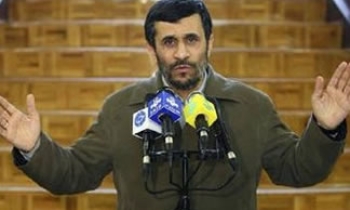Pushed on the backfoot over its decision on new controls over the distribution of news, photographs and graphics by foreign news agencies, China has called it is only a "transitional arrangement" and a government department would eventually take over the responsibility.

The comment by Deputy Director of the State Press and Publication Administration Liu Binjie followed criticism from press freedom organisations besides the US and European governments over last Sunday's circular stating the news content of all foreign news agencies serving mainland subscribers must be approved by Xinhua.
"It is a transitional period in which Xinhua will be given the authority by the government to manage [foreign news agencies in China]," Liu told a press conference during which he was repeatedly asked by foreign reporters about how China could ensure a level-playing field after appointing Xinhua to censor and issue licences to its competitors, the South China Morning Post reported.
"In future, they will come under the supervision of a government department. As we improve the law and regulation, this problem will be resolved." He did not specify the duration of the "transitional period". Xinhua is the mainland's largest government-run news agency and a flagship of China's propaganda apparatus.
Over the past years, Xinhua has been administering the release of news and information of foreign news agencies in China, and there are no changes whatsoever in this regard, he said. "The Chinese government will guarantee the rights and freedom of journalistic activities of foreign media in China. Such a policy has not been changed," Liu said, adding that such activities will not be affected by the new measures.
"Xinhua News Agency acting as the regulator of China-based foreign news agencies is a long-established practice. The Chinese government's policy to open up to foreign media has not changed and the Chinese government will guarantee the rights and freedom of foreign media to report in China according to the law," he said.

The new measures took effect immediately Sunday upon being issued by Xinhua. The regulations give it broad authority over foreign news agencies, requiring them to distribute news, photos and other services solely through Xinhua or entities authorised by Xinhua. Xinhua announced that the new regulations, called Measures for Administering the Release of News and Information in China by Foreign News Agencies, would take effect immediately. Under these measures, Xinhua would retain the right to select the news distributed within China, and would delete any materials found to:
- Violate the basic principles enshrined in the Constitution of the People's Republic of China;
- Undermine China's national unity, sovereignty and territorial integrity;
- Endanger China's national security, reputation and interests;
- Violate China's religious policies or preach evil cults or superstition;
- Incite hatred and discrimination among ethnic groups, undermine their unity, infringe upon their customs and habits, or hurt their feelings;
- Spread false information, disrupt China's economic and social order, or undermine China's social stability;
- Propagate obscenity and violence, or to abet crimes;
- Humiliate or slander another person, or infringe upon the legitimate rights and interests of another person;
- Undermine social ethics of the fine cultural traditions of the Chinese nation;
- Include other content banned by Chinese laws and administrative regulations.

Any foreign news agency found to be violating these rules could be suspended or its rights to provide news within China cancelled, Xinhua said on its English-language website. The measures will also affect the distribution on the mainland of information released by news agencies in Hong Kong, Macau and Taiwan.
The restrictions came weeks after a Chinese researcher for the New York Times was jailed for three years for fraud and a Hong Kong-based China correspondent for Singapore's Straits Times was sentenced to five years in prison for spying for Taiwan.
The regulations threaten to disrupt a business valued by major Western financial news providers at about $100 million a year, the New York Times reported. Most of the revenue comes from banks and brokerage houses that subscribe to Western news and data services to keep abreast of developments affecting stock, bond and currency markets. Very few news outlets in China subscribe directly to foreign wire services.
"Xinhua's new rules will have no effect on the way we cover and provide the news globally," said Clayton Haswell, director for Asia and the Pacific for the Associated Press, a news agency likely to be affected by the new rules, in a statement released to the Committee to Protect Journalists (CPJ). "But this raises serious concerns for AP regarding fair trade and the free flow of information within China."
A Reuters spokeswoman said that the agency was examining the new regulations. "We are studying these rules closely to see how they differ from the current guidelines and will be discussing the details of the new regulations with Xinhua," said Samantha Topping. Bloomberg News declined comment.
China's Premier Wen Jiabao said on Wednesday during a visit to London that China's open policy towards foreign media and financial information agencies remained unchanged and the government would protect their freedom and rights. The same day, Xinhua published comments by its vice president, Lu Wei, who said it was unfair the developed world had a near monopoly on the global flow of financial information.
A senior official of Xinhua, however, said that violations of tax law and other regulations were behind the issue of new rules banning foreign news companies from dealing directly with local clients, the Financial Times reported Thursday.
"Many news agencies have violated a large number of national laws and regulations," Yuan Xiaoping, deputy director of Xinhua's central administrative office, told the Times, although he declined to elaborate. Yuan said Xinhua would not disrupt the operations of its foreign counterparts, nor would it attempt to profit from controlling their business. He said tax and other legal issues could be avoided by foreign news agencies by allowing a Xinhua-appointed agent to handle relations with Chinese clients.

Xinhua said in an overnight report seen on Thursday that foreign news outlets in China had to follow domestic law. Xinhua said it was not seeking commercial gain from new rules controlling foreign news organisations, adding the updated regulations will not fundamentally change the government's oversight of media, Reuters reported.
"We will take an open attitude to do things well in accordance with the law and provide a good service. Xinhua seeks no economic gains therefrom," it said. Xinhua reiterated that the rules were to ensure the orderly dissemination of financial news in China. "The measures are aimed at protecting the legitimate rights of foreign news agencies in China and ensure the smooth circulation of financial and economic information," it said. "In the meantime, foreign news agencies should abide by China's laws and regulations when releasing news and information in China, and they should manage their business in a legal way in China."
"This latest action is part of a coordinated attack on free expression that is potentially damaging to China's own economic development," said Aidan White, International Federation of Journalists (IFJ) General Secretary. "It is part of a concerted effort to impose a culture of ignorance and prejudice at a time when many sections of society are waking up to the benefits of a free media."
"China's announcement of these measures is something that gives the commission real cause for concern," European Union spokesman Johannes Laitenberger said in Brussels, calling Beijing's move a "clearly negative development." EU had underlined its concerns about the freedom of expression in China at an EU-Asia meeting in Helsinki and will raise the thorny issue again at upcoming human rights talks with Beijing, he said, according to a Deutsche Presse-Agentur (DPA) report.
"These Measures are an authoritarian attempt to control news and information dissemination and the access of China's users to uncensored news and information," said Sharon Hom, Human Rights in China (HRIC) Executive Director. "The Measures reflect an intensification of hard-line information control. It is not an approach that respects individuals' freedom of expression, a free press and information transparency. It also breaches Beijing's commitment to allow journalists to freely cover the Olympic Games in 2008. These latest Measures sound a wake-up call to the international community that a closed, state-controlled Olympics is on the horizon."









